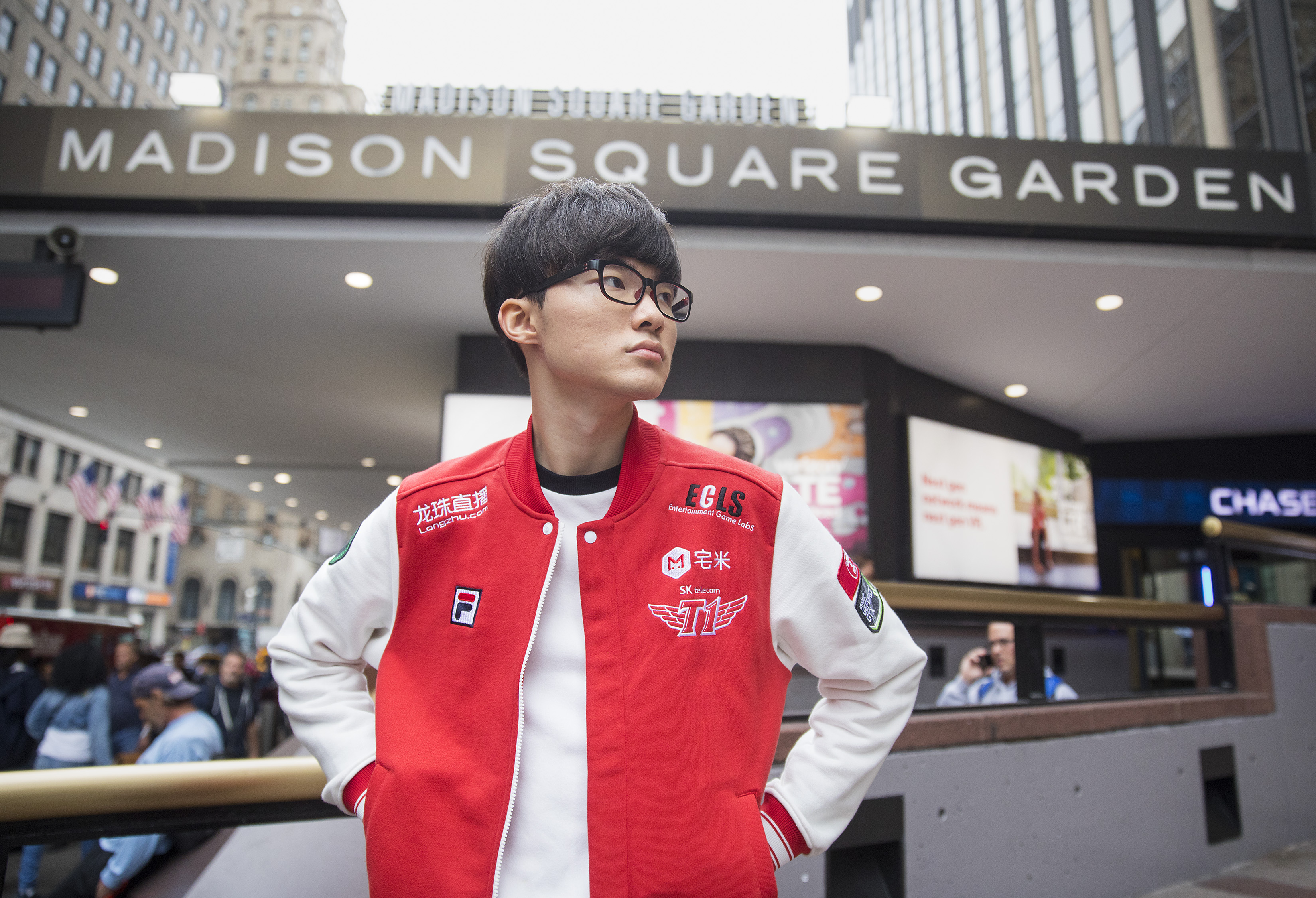Exploring the World of Esports
February 1, 2023
What is esports? What is the difference from playing computer games?
When do you become a “player” and when do you become an “athlete”?
Esports is the professional playing of video or electronic games in professional leagues by professional players. A professional league is required to be organized, with a defined set of rules. Just like how playing soccer with friends doesn’t make you a professional soccer player, playing games on your phone or computer doesn’t make you an esports player.
When and where did esports first originate? Which countries and companies are considered as pioneers in the industry?
Esports first emerged in 1972, with the first competitive match being held at Stanford University where players competed in the game Space Invaders. The prize was a one-year subscription to Rolling Stone magazine. The 1980 Space Invaders tournament held by Atari, in which 10,000 people participated, can be considered as a precursor to modern esports.
In terms of countries, the United States was a pioneer in the 80s by forming national video game teams. Also, the company Nintendo, which was established in the 1800s and originally sold playing cards, entered the gaming console market in the 80s with their Game & Watch and Gameboy consoles, which sold over 40 and 100 million units respectively. This helped to establish a culture of gaming.

Nintendo, Game & Watch
A more significant number of participants was seen in 1997 with the Quake tournament, where the game developer John Cormak put up his Ferrari as a prize. The winner, Thresh (Dennis Fong), became the first professional e-sports champion and also made it into the Guinness World Records as the first professional gamer. From then on, games like Counter-Strike, Quake and Warcraft were played in professional leagues such as the World Cyber Games.
In the 2000s, global tournaments began to take place, and this was also the time when the Korean esports Association was established and Asians started to take an interest in esports and gaming industry.
What are the most popular esports games? Are all games suitable for esports or are there specific games that are designed for competitive play?
Popular esports games include League of Legends (LOL), Dota 2, Zula, Hearthstone, Halo, FIFA, and StarCraft. Not every game is suitable for esports, the game should not have a significant luck factor, should provide equal conditions for all players, and the conditions for winning should be clear. For example, Minecraft is one of the most actively played games but it does not fit in the esports category as it does not have a clear winner or loser.
Is esports a true sport?
Esports can be considered as a sport according to the definition of sport, which includes:
* A competitive element
* Does not harm any living being
* Not dependent on a single equipment provider
* Not dependent on any element of chance specific to that sport. Esports meet these criteria, and thus can be considered as a sport.
Both individual and team esports competitions exist. For example, there is the Tetris World Championship, which has been held since 2010 and is played as a solo game. The Fortnite World Championship is also held both as a solo game and as a 2-player team game.
Esports in Turkey?
Esports in Turkey has a relatively short history. Dark Passage is considered to be the first Turkish esports team, founded in 2003. They had success in international arenas, particularly in CS:GO, FIFA, StarCraft 2, and League of Legends.
In recent years, major Turkish football clubs such as Beşiktaş, Fenerbahçe, and Galatasaray have started to establish esports clubs.
Currently, there are over 15,000 amateur e-sports teams in Turkey. The number of licensed clubs and players, which are licensed by the federation, is also rapidly increasing. As of now, there are around 60,000 players, including 63 women, who are licensed e-sports players in Turkey. TESFED, the Turkish e-Sports Federation, was founded in 2018 and it is also a member of the newly established European e-Sports Federation. Furthermore, looking at the number of spectators, e-sports is a topic that is followed mostly by young people under 25 in Turkey.
As for tournaments, there are many esports tournaments organized in Turkey such as The Turkey Championship League (TCL), Espor Lig Türkiye (ELT), Esports Turkey Championship (ETC), and many more. These tournaments host variety of games like League of Legends, Counter-strike: Global Offensive, PUBG, FIFA, and more.
Is it possible for us to organize our own tournament, or are there specific conditions that must be met?
Tournaments can be held in a single day or can be spread out over a period of time, similar to other sports competitions. Single-day tournaments can take place, but professional leagues often consist of matches that are spread out over a period of time, with elimination determined by season-end points.
Anyone can organize their own tournament, but each game has its own rules and regulations, and tournament organizing and participation conditions are usually published by the local office of the game developer company or on the game’s website. For example, League of Legends, if your account is new and you have never organized a tournament before, they may have restrictions on the number of teams and in some regions, they may shut down servers during peak hours. If you don’t meet the tournament conditions, they can reject your application altogether. There are even platform available that only provide tournament organization and score keeping functions like tournament.com which allows you to organize tournaments for up to 4000 players and also keeps track of tournament statistics.
How does one become an esports player in Turkey? Is it a career or hobby? Can I participate in tournaments without obtaining a license? How official are these processes?
To become an esports player in Turkey, one must obtain a license from the Youth and Sports Ministry in their province by applying with the help of parents or a manager. It is definitely a career, as it requires a significant level of dedication and commitment, not just a hobby. It requires a lot of practice to become proficient in a game and get noticed by teams, and often requires upgrading to better equipment. This is not only limited to the playing aspect, but also offers career opportunities in areas such as coaching, refereeing, broadcasting, analysis, human resources, event management, and legal and financial expertise.
What is the life of an esports player like? What is the work discipline?
In an industry where players like Faker have made millions, reaching that level requires significant sacrifice. These players typically quit school or other obligations in order to fully dedicate their lives to gaming and to perform well on stage. Many retired by the age of 24. They spend all their time outside of sleep on game and tactical training. They live in “gaming houses,” which are special homes equipped with top-of-the-line equipment that teams provide for their players. Even university scholarships are becoming an attractive option for young players.

Faker, Legendary LOL player
As they become more skilled at the game, their popularity increases and they develop their own fan base. They can stream live on platforms like Twitch, where they interact with fans. Successful players are treated like celebrities on the internet, with thousands of followers and reaching millions of simultaneous viewers during their live streams.
Is there a distinction between female and male players/teams in esports?
Yes, there is. This is one of the major controversial topics; Zula has separate leagues for women and men. Same with League of Legends.
Some games and tournaments do not allow female participation. This can lead to female players forming separate women’s teams and organizing separate tournaments. Additionally, female players may receive less support and earn less prize money compared to male players. Efforts are being made to provide equal opportunities for female players to prove themselves and achieve equal recognition.
How does the esports economy work? How do clubs, teams, players, game companies, audiences, tickets, broadcasters, sponsor companies, and advertisements interact? What is the dynamics of these relationships?
The esports economy operates in a complex way, with many different players involved. There are clubs, teams, individual players, game companies, viewers, ticket sales, broadcasters, sponsor companies, and advertisements all playing a role.
Unlike traditional sports leagues, esports clubs often wear multiple hats, acting as both organizers, broadcasters, and content creators. A single organization can be responsible for financing a tournament through brand partnerships, acquiring broadcast rights, and distributing content (sometimes exclusively) on paid platforms.
The foundation of esports is the game publishers, but these companies also host some of the largest tournaments in the world. The revenue generated from these tournaments is significant, allowing game publishers to market their games as free-to-play. The global esports economy is estimated to be worth around $21 billion. For example, Riot Games, which is based in the US, but is actually owned by Chinese conglomerate Tencent, which is also the owner of WeChat, a major messaging app in China. Thanks to the investment power of Tencent, the game was able to make a successful transition to esports.
Developers, who create the games, are the first layer of the ecosystem. Following them are teams and players, many of whom stream their gameplay on platforms like Twitch, earning money from both their team and from individual sponsorships and advertising deals. Players with strong broadcasting skills may also transition into becoming commentators, analysts, or community managers for both broadcasters and tournament organizers.
Esports clubs typically manage multiple teams across different games, with some teams focused on specific demographics such as women or university players. Many esports clubs are created by entrepreneurs or entertainment companies through investments. Brands such as Red Bull, Roccat, and Kinguin also sponsor teams.
Teams rely on tournament organizers for financial stability and income, with prize money from events being a key metric for personal and team success. Currently, sponsors make up the majority of team income through brand activation on uniforms, in-broadcast promotions, and exclusive hardware deals, similar to traditional sports teams like Nike and Adidas sponsored soccer teams.
In the third layer, we have tournament and league organizers. Just like game developers, other third-party companies also organize their own tournaments. The rights to these broadcasts are sold to streaming platforms. Exclusive deals are becoming a growing monster in these agreements; for example, viewing numbers on Twitch for Counter-Strike: Global Offensive decreased significantly after the ESL Pro League’s streaming rights were purchased by YouTube. Facebook and Twitter are also starting to legitimize themselves as sources of esports content by making deals with teams and league organizers.
Currently, esports events are free to watch. League organizers can still make money from individual esports fans through real ticket sales (prices are still on the lower end overall), and there are also partnerships with growing regional markets and smaller tournament organizers as the number of TV deals increases.
Lastly, brands and advertisements. Brands are clearly the biggest source of revenue for each sector, but the nature of sponsorship/partnerships depends largely on the assets in question.

Top 10 tournaments of 2021
In summary, the esports economy involves various relationships and interactions between players, teams, game developers, tournament organizers, fans, and sponsors. Game developers and publishers such as Riot Games create the foundation for esports by creating and promoting popular games. Teams and players work to improve their skills and promote themselves, often through streaming on platforms like Twitch. Tournament organizers and leagues then host events and competitions, often selling broadcasting rights to streaming platforms. Finally, sponsors and advertisers play a large role in generating revenue for the industry, supporting teams and events through branding, product placement, and other marketing efforts. Overall, the esports economy is a complex and growing industry with a large and dedicated audience.
LOL and The big three effect
When analyzing the development of esports in Turkey, it’s important to mention Riot Games, the creator and owner of League of Legends. The company, which has reached a revenue of around $1.6 billion, is one of the major driving forces behind esports through the offices they open in the countries they operate in and the local tournaments they organize. Riot Games is also one of the pioneers of professionalization in Turkey, and it has been able to attract the country’s three biggest sports clubs, such as Beşiktaş, Galatasaray, and Fenerbahçe, to League of Legends. This has obviously led to a significant increase in interest in esports in the country.
The Future of esports
The future of esports looks very promising, with many experts predicting continued growth in terms of audience numbers, revenue, and investment. The increasing mainstream acceptance of esports as a legitimate form of competition and entertainment is expected to drive this growth. Additionally, advancements in technology, such as virtual reality and 5G networks, could lead to even more immersive and interactive experiences for both players and spectators. The industry is also expected to become more professionalized, with more structured leagues and teams, and increased player salaries and benefits. Additionally, we might also see more collaboration between traditional sports organizations and esports teams and leagues, as well as the inclusion of esports in major international events like the Olympics.
However, it’s also important to note that there are challenges that the esports industry will need to address, such as player burnout, the need for standardized regulations, and ensuring fair competition. Overall, the future of esports is exciting, and it will be interesting to see how the industry continues to evolve.
The illusion that esports players are asocial, lame, obese types?
Esports players are not stupid, asocial and lame types as it is thought. Games such as counter strike global offensive, league of legends, dota 2 are based on intelligence, strategy, attention and reflexes. We can compare the memorization part of the job to muscle memory in football. If we discard the reflex part, it is no different from chess. Being able to predict the opponent’s moves, determine what you need to do in seconds and implement it successfully requires serious discipline: An esports player is always in touch with all his teammates, constantly participates in tournaments and events, uses his social media accounts effectively, and some of them broadcast to thousands of people. If we think about it, it would be unbearable to talk about asociality :)
In games like Starcraft, sometimes you have to build hundreds of armies, servants and production resources that provide raw materials, buildings that process these resources, and control your opponents throughout the game. In the example video below, notice the value of apm: Apm ie action per minute: refers to the number of actions you take in the game per minute. He takes 400 actions per minute in the game, controls his army, tries to get the wounded units to the safer parts of the army so that they do not die, makes sure that the units that collect resources are constantly produced and go to the right places, etc. etc.
To call these people losers is to shake them out of my pee without knowing the subject :))


